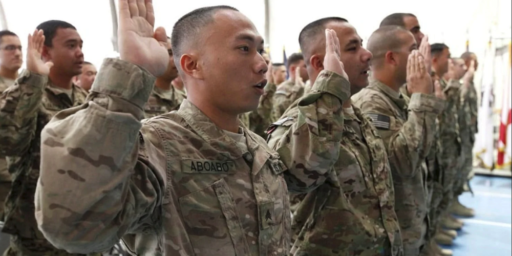Army Quickly Punishes Abusive Drill Sergeants
The Blogosphere is abuzz with an Associated Press story of abusive treatment by Army drill sergeants.
Army Recruits Quickly Abused in Training (AP)
The recruits of Echo Company stumbled off the bus for basic training at Fort Knox to the screams of red-faced drill instructors. That much was expected. But it got worse from there. Echo Company’s top drill instructor seized a recruit by the back of the neck and threw him to the ground. Other soldiers were poked, grabbed or cursed. Once inside the barracks, Pvt. Jason Steenberger says, he was struck in the chest by the top D.I. and kicked “like a football.” Andrew Soper, who has since left the Army, says he was slapped and punched in the chest by another drill instructor. Pvt. Adam Roster says he was hit in the back and slammed into a wall locker.
Eventually, four Army drill instructors and the company commander would be brought up on charges. Four have been convicted so far.
The tough-as-nails D.I. who berates and intimidates recruits with remarkably creative profanity is a familiar figure to generations of men who went through the Army or the Marines, and a stock character in the movies — “Full Metal Jacket” and “An Officer and a Gentleman,” among them. The idea is to break the recruit down, instill discipline and make him a well-trained part of a cohesive fighting unit.
But Army regulations in effect since 1985 say superiors cannot lay a hand on their recruits to discipline them. The Army’s Training and Doctrine Command regulations also disallow any physical or verbal hazing, which includes “cruel or abusive tricks.” Vulgar or sexually explicit language is also prohibited.
A similar policy existed prior to 1985 as well. My dad was a first sergeant of a Military Police One Station Unit Training (Basic Training and Advanced Individual Training combined) company from 1980-1983 and had to relieve drill instructors for using abusive language to recruits; certainly, physical hazing such as described in the AP story would have been grounds for court martial.
McQ, who commanded an Infantry AIT company, also condemns the abuses described above.
John Cole is angered by this, although some of his commenters think this is the proper way to prepare men for war. (Editor’s note: It isn’t. The way to inculcate courage under fire as an institutional norm is to build trust in the leadership and a sense of comraderie. Abuse tends to work against those things.)
Ed Morrissey wonders about the journalistic angle of the story:
[T]he Army had the right processes in place to catch this abuse when it occurred and prosecuted the people responsible. That sounds to me as though the Army doesn’t tolerate abuse and is willing to punish those who break the rules, in this case with serious jail time.
One has to wonder why the AP decided to run this story now, and why the Washington Post thought it newsworthy more than four months after the fact, and why both pushed the Army’s quick reaction to the bottom of the story.
Like McQ, I think this is a legitimate story. Like Ed, though, I would prefer to see it cast in the proper light. The headline “Army Recruits Quickly Abused in Training” is sensationalistic and gives the impression that this is the norm. “Army Quickly Punishes Abusive Drill Instructors” is much more accurate, although it would sell fewer papers.
Chris Bowers falls for the AP/WaPo spin, though, and broadens this to a scandal for the entire military:
As if the U.S. military didn’t have enough scandals going between Abu Ghraib, Guantanamo and the ghost detainees, now we learn it is abusing its own recruits.
Actually, four drill sergeants at one base were abusing their recruits, while a lousy C.O. allowed it to happen. They’re all going to jail.
It’s a sad fact of life that some people will abuse power. This is by no means unique to the military. Anyone who has participated in fraternity pledge week knows that. Prison guards, prep school students, even Yale undergrads participating in a psychology experiment, demonstrate that time and again.





I am currently an Active Duty U.S. Marine Gunnery Sergeant. I served as a Drill Instructor at MCRD San Diego from Jul 1995 to Jul 1997. I know from my experiences that abuse, physical or verbal, is not tolerated. Does it happen? On occasion, yes but when it does the perpatrators are usually caught and punished.
Recruits are screened by their Series Commanders several times during the training cycle and their are a variety of avenues for recruits to report abuse (Chaplains and Medical Personnel for example).
Having been a Drill Instructor I know that there is intense scrutiny of all aspects of recruit training. I have no doubt that the other branches scrutinize the recruit training programs as well. Serving as a Drill Instructor at MCRD San Diego is like living in a fish bowl — everybody is watching you.
Sheesh….not the drill sgt hurt me thing again
oh gee your sooooooo smart – you can spot sensationalism, if you really learn to pay attention perhaps you will see that the very nature of you hobby here (blogging) is indeed to prey on that very tool of sensationalism.
Power to the people? more like power of a select people over those people who need to be controled.
Tom, quit harshing my mellow. We are talking about the integrity of the Main Stream Media, which has been proven time and again to have no ethics, morals or values.
The fact that the Army didn’t waste time investigating it tells me several things: That this company was being watched, that the allegations of abuse were taken seriously and investigated and found to be true, and that for the morale of the rest of the battalion and brigade, punished for their negligence and provable poor judgement.